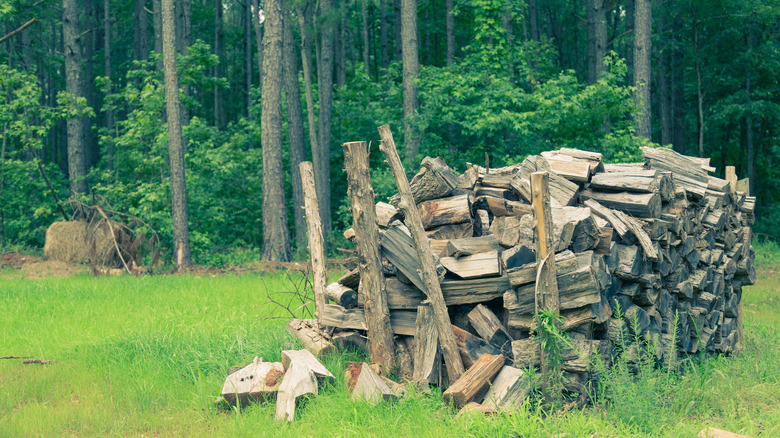3 Tricks To Keep Your Home Bug-Free This Winter
Warm-weather insects may be more prevalent, but the winter ones are no less annoying, especially when they take up residence inside your house. Seeking shelter and protection from the cold, as well as looking for food, water, and a place to reproduce, bugs will happily hunker down in a warm house during the cold winter months. And unless you take the proper steps, your home could be their next bungalow. Implementing pest prevention strategies, even as early as late summer, is the key to enjoying an insect-free winter. Three basic approaches are essential for keeping your home bug-free when the temperature plummets: sealing any potential points for entry; ensuring the premises are kept clean inside and out; and deterring, repelling, and controlling unwanted squatters.
A bug-free home in the winter is of utmost importance; otherwise, as the School of Bugs notes, eggs and larvae might be waiting in the wings to emerge indoors in the spring. Some familiar, unwanted winter companions include ants, beetles, ladybugs, and silverfish. Cockroaches, spiders, stink bugs, and ticks are others that might be joining you inside. According to Iowa State University Extension and Outreach researchers, insects are negatively affected by temperatures of less than 50 degrees Fahrenheit. So expect them to try to join you in the winter unless you fight back.
1. Guard all entry points
Barring bugs in the winter begins with sealing off potential entrances in the fall. Inspect inside the house and out, from top to bottom, looking for any weak spots. Beeline Pest Control cautions that if an opening is large enough for a pencil to penetrate, it can be an access point for thousands of insects. Large holes or spaces can be filled in using spray foam or caulk, and even small cracks in walls or ceilings should be filled with the proper materials. Doors need to be sealed, preferably with an aluminum or steel threshold or door sweep, and frames should be reinforced using weather stripping or caulking. For effective bug prevention, windows should be outfitted with fine-mesh screens.
Got Bugs advises considering tightly sealed doors and windows. Likewise, any cable or plumbing that enters should be reinforced against insects. Per Killingsworth Environmental, exhaust fans and dryer vents are potential entry points for critters, especially roaches and ants, and cockroaches easily slip through doors. Exposed piping should be insulated too. Look for any gaps in the foundation or defects in the siding, and don't overlook the roof, extensions, or add-ons. JP Pest Services recommends thoroughly examining corners and gutters and making any necessary repairs.
2. Keep premises clean
A clean house means fewer hiding places for your unwanted winter visitors. In winter, insects come inside seeking warmth but remain indoors because of food, according to Cooper Pet Solutions. There are several effective tactics to outfox your opponents in their search for food. Use airtight containers for storage. Serve and eat food in one room only. Sweep crumbs and wipe up spills zealously, and don't leave out pet food longer than necessary. Trashcans should be lidded and emptied daily. Many winter bugs infiltrate the home from the grocery store, so make it a habit to inspect food before buying and bringing it inside. Bug Tech stresses vigilance so insects don't enter the home on items, including used furniture, boxes from storage, or outdoor camping gear. Your Christmas tree might be carrying insects, so examine it.
Firewood is a haven for insects, so avoid stacking it against the house. Pest World suggests placing cords 20 feet away and several inches off the ground. Thoroughly eyeball firewood when bringing it into the house to prevent hitchhikers, not to mention the possibility of a copperhead. Clear wood debris, remove leaf piles from the yard and keep the side of your house free of mulch. Excessive moisture or standing water are insect magnets, so purchasing an attic or basement dehumidifier is a wise investment. Keep wet areas to a minimum by inspecting faucets, pipes, and sinks for leaks. Make sure stagnant water is not pooled outside the home.
3. Deter, repel, and control
The natural insect deterrent lemon eucalyptus oil and the synthetic picaridin get good marks from Consumer Reports. Insects are repelled by rosemary, citronella, peppermint, and lemongrass. Cedar oil and boric acid work against silverfish, cockroaches, and ants. MyMove touts the efficacy of vinegar, which is potent enough to exterminate insects without harming pets or humans. Applying vinegar around vulnerable points or placing an orange scent at window sills will discourage bugs from coming inside. Pesticides should be sprayed on baseboards. They can be used outside to prevent bugs' eventual entry, and repellents should be reapplied as they lose potency.
Before setting up shop in the winter, many insects gather on the side of houses in the fall, according to Maggie's Farm. Look for them on the sunny side of the home, and spray them with a garden hose to disperse them. Many apparent winter bugs are these fall gatherers who were able to enter the house successfully before the cold snap was in full effect. The Sun advises changing outdoor lights to ward off potential winter invaders if necessary. It claims that blue or white lights will attract insects, so it recommends switching to yellow or orange LED ones. A home hospitable to natural predators such as birds, bats, or insects will cull the winter-bug population.



